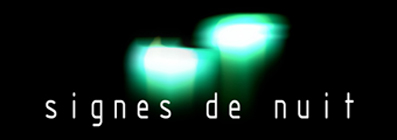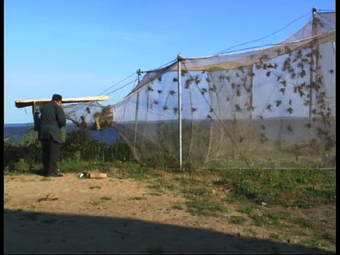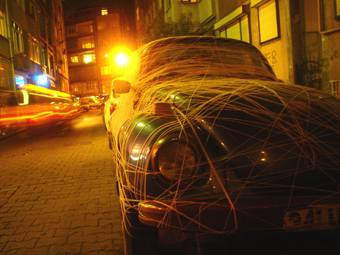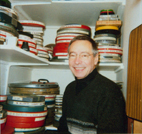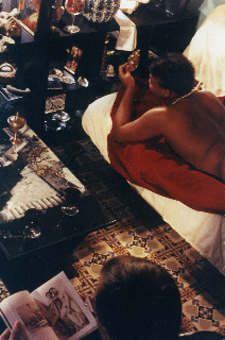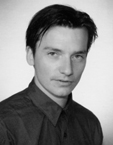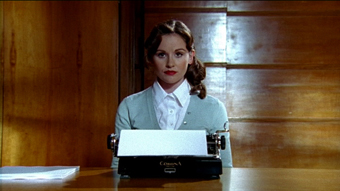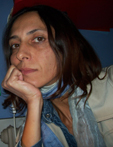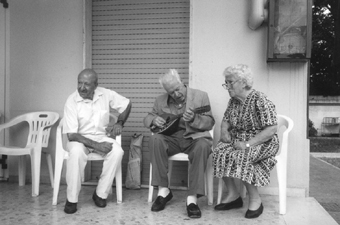5ème Festival Signes de Nuit
Les membres du jury 2007et leurs propositions
Mercredi 13 juin
18 heures
Indre Blusiute (Lituanie / Lithuania)
Pendant dix ans le théâtre était sa passion. Elle est diplômée de l’Académie de Musique de Lituanie - Faculté de Théâtre et Cinéma. Etant actrice professionnelle, elle a joué dans plusieurs spectacles à Vilnius et à l’étranger. Puis, le cinéma et surtout le court-métrage, ont pris petit à petit une place importante dans sa vie. Elle est présente dans plusieurs festivals en Europe. Depuis 5 ans, elle est responsable de la programmation, ainsi que de la coordination générale, de deux festivals en Lituanie : Festival International de Court-Métrage « Tinklai » et de la Compétition Internationale du Court pour le Festival de Vilnius « Kino pavasaris ».
She was in love with dramatic arts for ten years. She completed the Academy for Music of Lituania, in the Theatre and Cinema department. Her professional career started with a number of plays in Vilnius and abroad. Then, her interest in cinema grew, she starred mostly in short films and today, cinema is her main field of activity. She takes part in a number of film festivals around Europe. For 5 years now, she has been in charge of the line-up and general organisation of two festivals in Lituania : the International Short Film Festival « Tinklai » and the International Short Film Competition, as part of the Vilnius Festival « Kino pavasaris ».
présente
Lenas
de Janis Lacis, Domas Burkauskas, Rimanté Kulvinskyté, Hanna Myllys, Olga Bulgo, Mariuas Nemanis
Lituanie / Lithuania
2006
DV
0:07:05Leonas travaille à la station ornithologique de Vente depuis 1956. Il a traité près d'un million d'oiseaux dans sa vie. Devant la caméra, il résume sa philosophie de la vie.
Leonas has worked in Vente ornithological station since 1956 He has threated nearly a million birds during his life. In front of te camera he resumed his philosophy of live.
Jun´ishiro Ishii (Japon)
Né à Fukuoka au Japon en 1975 il y a étudié le design d’intérieur puis les Beaux arts. En l’an 2000, il s’est tourné vers l’art contemporain et a commencé à développer ses projets artistiques in situ. En 2004, il a été invité pour une résidence d’artiste à Séoul en Corée du sud et depuis 2006, il vit à Paris. Il a exposé au Japon, en Corée du sud, en Turquie et en France. Il a participé également à des festivals internationaux d’art vidéo en Italie, en Grèce, en Iran, en Estonie, en Afrique du sud et au Brésil. Il est extrêmement intéressé par l'observation de la culture locale mais, en ajoutant une forme symbolique à sa particularité, il transforme cette culture locale en œuvre d’art in situ. Pour couvrir cette temporalité des œuvres, il emploie l'art vidéo. La vidéo n’a pas seulement pour but de constituer une archive, mais fonctionne indépendamment comme une œuvre d'art et représente une approche différente et permet ainsi, de découvrir le projet sous un autre angle.
Jun’ichiro ISHII born in Fukuoka Japan 1975. He studied interior design and fine art in JAPAN. From year 2000, he changed his way to more contemporary and started work with site-specific art. In 2004 he was invited to have artist residency program in Seoul, South Korea. And since 2006, he is living in Paris. He had exhibitions in Japan, South Korea, Turkey and France. And he was participated international video festivals in Italy, Greece, Iran, Estonia, South Africa, and Brazil. He is extremely interested in observing cultural localities. But adding a symbolic form to the peculiarity, he generates these cultural localities to the site-specific artworks. For covering this temporariness of the works, he employs the video art. It is not only for archives but independently functioning as an artwork which represents another approach to discover the project from other angles.
présente
Silkworm (Ver à soie), de Jun´ishiro Ishii et Chihiiro Akutsu
Japon
2005
DV
0:10:08
Sur la route
Alors que les jeunes alcooliques turcs errent chaque week-end dans la rue animée de Kadifee, quartier de Kadkoy, à Istanbul… Une vieille Volkswagen bleue, reste immobile. En avril 2005, deux artistes japonais ont décidé de tromper le regard du passant. Voici comment est né « Silkworm », projet artistique in situ.
On the Road
The old blue Beetle from Germany stood still in the street of Kadifee in the town of Kadkoy, Istanbul where alcoholics roam around every weekend. In April 2005, creators from Japan decided to nuzzle up to it. This is how the site-specific artwork, 'Silkworm', started.
Marcel Mazé (France)
Marcel Mazé est Président d’honneur-fondateur du CJC, photographe, réalisateur, programmateur. Né à BREST (Finistère, France) pendant les bombardements, lors de la 2e guerre mondiale. Chargé de l'administration de la revue CINEMA 9 en 1969 et 1970 et Fondateur du FESTIVAL INTERNATIONAL du JEUNE CINEMA d'HYERES (Var – France) avec notamment le création de la section dite "Cinéma de Demain" qui deviendra la section "CINEMA DIFFERENT" et en assure la sélection et programmation jusqu'à la fin du festival en 1983. En 1970, il crée le Collectif Jeune Cinéma, érigé en coopérative en 1971, refondée en 1998. Il eeen assure la présidence jusqu’en 2005. Co-organise et anime de nombreuses projections à Paris et dans le monde. Il est le co-fondateur D’UN CINEMA l'AUTRE en 1999. Sélectionneur, et programmateur. Il organise, en 1998, 99, 2000 "Les Cinémas de Kerlouan pour Ménéham" (Finistère Nord). Il est le réalisateur de« Focalises » (1980) et « Les mille et un soleils de Pigalle » (2007). Comme photographe Marcel Mazé gagne le 1er Prix du Concours national en 1983.
Marcel Mazé is Honorary President and founder of the CJC (« Young Cinema Society »), a photographer, a film-director and a film programmer at various festivals. He was born in BREST (region of Finistère, France) during World War Two bombings. He headed the CINEMA 9 journal in 1969-1970 and founded the « International Festival of Young Cinema of Hyères » (region of Var, France), created, as part of this festival, the « Tomorrow's cinema » section, later renamed « A different cinema », and was in charge of shortlisting films and drawing up the line-up for this section up until the last edition of the festival in 1983.
In 1970, he founded the CJC, which became a cooperative in 1971 and was revamped in 1998. Marcel Mazé headed the association up until 2005. He was co-organiser and master of ceremony of a number of film presentations in Paris and around the world. He co-founded « D'un cinéma à un autre » in 1999, shortlisted films and was responsible for the line-up. He organized the « Les Cinémas de Kerlouan pour Ménéham » festival (region of North Finistère) for three years 1998-2000. He directed « Focalises » (1980) and « Les milles et un soleils de Pigalle » (2007).Marcel Mazé won First Prize at the National Photography Competition in 1983.
présente
Les Métaphores d´Alex, de Stèphane Marti
France
2000
Super 8 › DV
0:15:00Ciselé au montage telle une pierre précieuse, ce film est un véritable manifeste néo-baroque. D’un côté, les miroitements de la Seine, les sculptures du Pont Alexandre III et les majestueuses descentes d’escaliers d’un personnage mystérieux ; de l’autre côté, en contrepoint, les éclats d’un miroir dévoilent un espace intérieur lascif, envahis d’œuvres d’art, d’objets insolites, de plantes tropicales, de lourds tissus. Au centre, trône l’Esthète qui contemple des photos de nus masculins. La voix cristalline d’un
contre-ténor célébrant Bach vient parachever la sensation de volupté qui se dégage de ce film.
Chiseled in the montage like a precious stone, this film is a truly neo-baroque manifest. On one side, the reflections of the Seine, the Alexander II bridge and the majestic downswing over the stairs by a mysterious character, on the other side the shards of a mirror showing an inner lascivious space, charged with art works, exceptional objects, tropical plants and heavy curtains. In the centre the aesthete is enthroned, meditating the photos of naked men. The crystalline voice of a famous counter tenor celebrating Bach accomplishes the sensation of pleasance, which the film is expressing.
Thomas Munz (Allemagne / Germany)
Thomas Munz travaille en tant que curateur indépendant spécialisé dans la production vidéo artistique contemporaine. Il est également rédacteur dans le domaine des médias actuels et s’intéresse plus particulièrement au rôle des médias numériques. En 1993, il fut le cofondateur de la société Werkleitz, le centre des médias de l’image artistique de Saxe-Anhalt et fut le rédacteur, organisateur et codirecteur de la Biennale Werkleitz jusqu’en 2000. Entre 1995 et 1999 il travaille comme coorganisateur, coordinateur de programme et rédacteur de Ostranenie, le forum international des médias électroniques du Bauhaus de Dessau. Il est responsable de la publication et de la programmation du festival international de Berlin d’Art et de Culture numérique, Transmediale, en tant que rédacteur (depuis 2001), programmateur et curateur vidéo (depuis 2003).
Thomas Munz works as an independent curator specialised un the contemporary artistic video production. He is on the same time editor in the actual medias and specially interested in digital medias. In 1993, he was the cofounder of the Werkleitz society, the centre of Medias and artistic images in Saxony-Anhalt and gets the editor and codirector of the Werkleitz Biennale in 2000. Between 1995 and 1999 he worked as coordinator and editor of the Ostranenie, the international forum of electronic medias of the Bauhaus in Dessau. He is responsible for the publications and the programming of the International festival of digital art and culture Transmediale in Berlin, as editor since 2001, as programmer and curator since 2003.
présente
Cabinet , de Tim Shore
Royaume Uni
2006
DV
0:18:20
Une petite cabane rustique dans le Montana sert de point de départ au film « Cabinet » de Tim Shore. C’est dans une cabane semblable à celle-ci que le terroriste américain Theodore John Kaczynski, plus connu sous le nom de Unabomber, a rédigé son manifeste « La société industrielle et son avenir », une critique philosophique du progrès technologique. Le Washington Post publia son manifeste en 1995, avec pour condition que l'Unabomber mette fin à ses activités terroristes. « Cabinet » prend la mesure du décalage entre l'argumentation irrationnelle de Kaczynski et la violence avec laquelle il tenta de la propager. "Cabinet" cherche à déconstruire et à saboter l'histoire de l'Unabomber, une histoire bien souvent romancée.
A little cottage in the Montage is the starting point of the film « Cabinet » by Tim Shore. It’s a cottage like the one, where the American terrorist Theodore John Kaczynski, more known under the name Unabomber has redacted his manifest “The industrial society and its future”, a philosophical critic of the technological process. The Washington Post published the manifest in 1995, under the condition, that the Unabomber gives up his terroristical activities. “Cabinet” is dislocating Kaczynski irrational argumentation and the violence, with which he tried to set it into operation. “Cabinet” tries to deconstruct and sabotaging the history of the Unabomber, which has been quit often romanced.
Simona Piattella (Italie / Italy)
Simone Piatella est née il y a 38 ans à Pescara en Italie, où elle vit et travaille. Son amour pour le cinéma a débuté dans les années 70 avec l’utilisation de la Super 8. Alors qu’elle étudie les langues étrangères, le théâtre et le cinéma, elle commence à organiser des événements culturels. Entre temps, elle réalise des vidéos et des courts métrages. Depuis 1996, elle est la directrice artistique du festival international de courts-métrages, Unimovie. Le festival est consacré aux jeune cinéma et les productions expérimentales afin de créer, comme le dit Simona, "un lieu de rencontre des idées et des sens. Dans un monde matériel en perpétuel changement, capturer un moment d’émotion est la force de cet art fondé sur les images en mouvement. Tout le monde est créateur et tout le monde pourrait prendre une caméra pour nous faire accéder à son monde intime et précieux, réel ou fantastique, souhaité ou craint." Aujourd’hui, Simona travalle à l' élaboration de projets vidéos et musicaux.
Simona Piattella was born 38 years ago in Pescara – Italy, where she lives and works. Her love for cinema started in the 70ies with the use of the S8 cameras. While studying languages, theatre and cinema, she started to organize cultural events. In the meantime, she directed various shorts and videos. Since 1996 she has been the artistic director of Unimovie shorts international festival. The festival is dedicated to young cinema and experimental productions "to create”, as Simona says, “a meeting point of ideas and senses. In a material world that changes from time to time, capturing a sensible moment is the strength of this art based on moving images. Everyone is a creator and everyone could take a camera and give us back a piece of his precious and intimate world, real or fantastic, wished or feared." Now she is working about video and musical projects.
présente
Concerto per sega e chitarra (Concert pour scie et guitarre)
de Simona Piattella, Guido D´Alessandro
Italie
2004
DV
0:17:00
Deux personnes âgées, deux amis, une scie à trouver pour jouer comme par le passé, encore une fois.
Two elderly people, two friends, a saw to be found in order to play again as in the past, once again.
